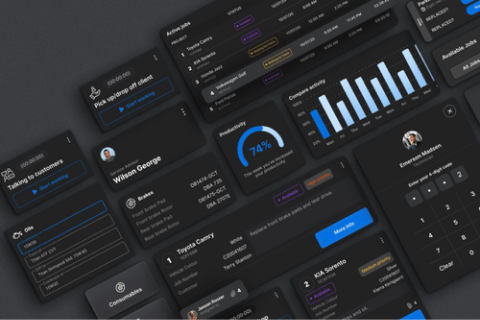If you’ve ever wondered how some websites seem to own the first page of Google while you’re stuck on page three, you’re not alone.
In 2025, AI SEO tools have become a game-changer. According to a HubSpot survey, 61% of marketers identify improving SEO and expanding their organic presence as their top priority.
These AI-powered platforms don’t just speed things up; they take the guesswork out of keyword research, content creation, and search engine optimization. And no—you don’t need to be a tech wizard.
In this guide, I’ll show you exactly how you can start using AI SEO tools to climb those rankings, even if you’re new to the game.
AI-driven strategies help ensure your content remains relevant as search engine algorithms and user preferences evolve, giving you a competitive edge in the digital landscape.
What is AI SEO?

AI SEO means using smart computer programs to help you do search engine optimization faster and better. These programs are called AI tools. They look at data from search engines and tell you what changes will help your website.
AI SEO tools can help with keyword research, content creation, and optimizing content. A report from HubSpot says 61% of marketers use SEO tools because they save time and improve results.
When you use AI SEO, you don’t need to guess. The tools give clear steps for on page optimization and help you write blog posts that get more organic traffic. Small changes can make your SEO efforts pay off over time.
Why Use SEO AI Tools to Improve Search Engine Rankings
You may ask, “Why should I care?” Simple. Search engines like Google show top ranking pages when you use the right keywords and good content.
AI powered SEO tools find search intent behind every query. They look at search engine algorithms, check search volume, and show you how to get more website’s visibility.
For example:
- Tools like Semrush or Ahrefs AI Content Helper show what people search for.
- AI SEO tools can check your google search console data.
- They help you fix meta descriptions, titles, and internal links.
AI SEO tools also offer keyword tracking features, allowing you to monitor how your keywords perform across search results and AI-generated answers.
AI SEO tools also help an online store get more visitors and sales. “AI doesn’t replace humans. It helps humans make better choices faster,” says a recent Forbes technology review.
"Ready for smart workflows that guide each step? Sign up for J6 Venture and turn keyword research, content optimization, and technical SEO into a seamless plan."
J6 Venture vs Semrush, Ahrefs, and More: Comparing the 10 Best AI SEO Tools for Beginners in 2025
10 Best AI SEO Tools for Beginners in 2025
Even SEO specialists now use AI tools to save time and improve results. SEO agencies and SEO teams also rely on these tools to streamline their SEO processes and implement advanced SEO techniques for better results. Keep reading to explore best tools for you:
1. J6 Venture AI‑Human SEO Platform
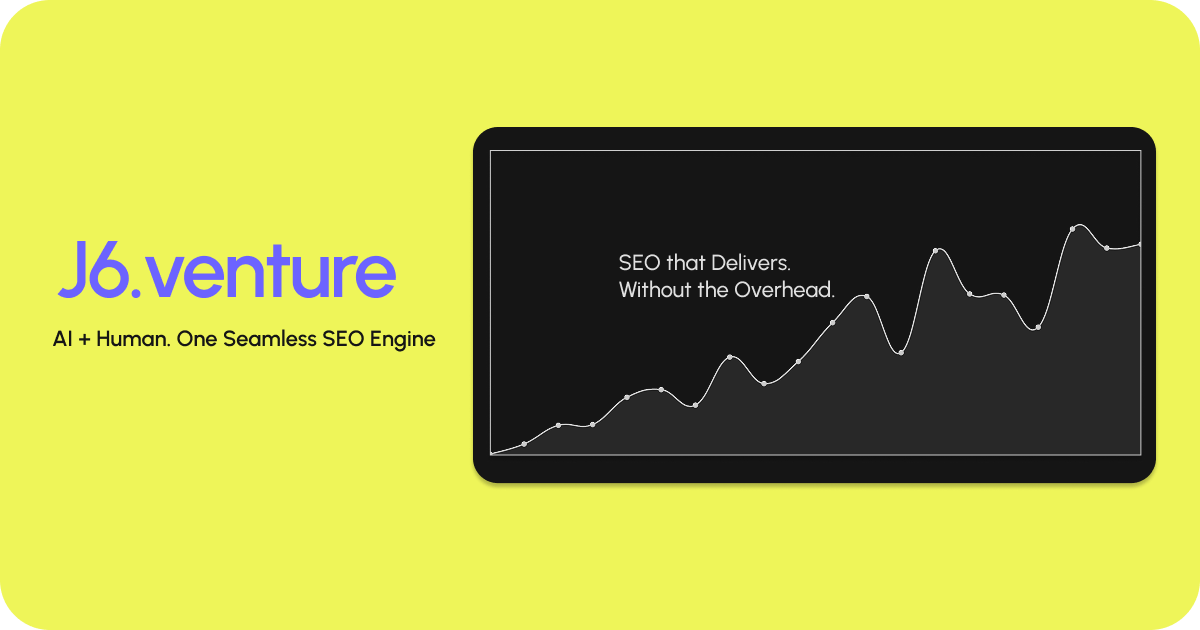
J6 Venture is a modern ai seo tool. It mixes artificial intelligence with human knowledge. This means you get fast seo tools and advice from real experts. The tool checks your site, your keywords, and your target audience.
“Combining AI and human input makes SEO planning 2x faster,” says a 2025 Tech Growth report.
Key Features:
- Keyword research: Uses AI to find search volume and easy topics.
- Content optimization: Helps with internal linking, meta description, and on page optimization.
- Technical SEO: Spots issues that can slow your site.
- Search engine algorithms: Updates you on changes in search engines.
- Client projects: Works well for agencies that manage many websites.
Best For:
- Beginners and seo teams.
- People who want human help plus ai powered seo tools.
- Agencies handling multiple client projects.
How to Use
- Sign up for J6 Venture.
- Add your website and link to Google Search Console.
- Use the dashboard to do keyword research and follow the AI plan.
- Apply the changes to your site and check results.
Pricing: J6 Venture has custom pricing. Most small businesses start at about $99 per month.
2. Semrush (AI Content Toolkit)
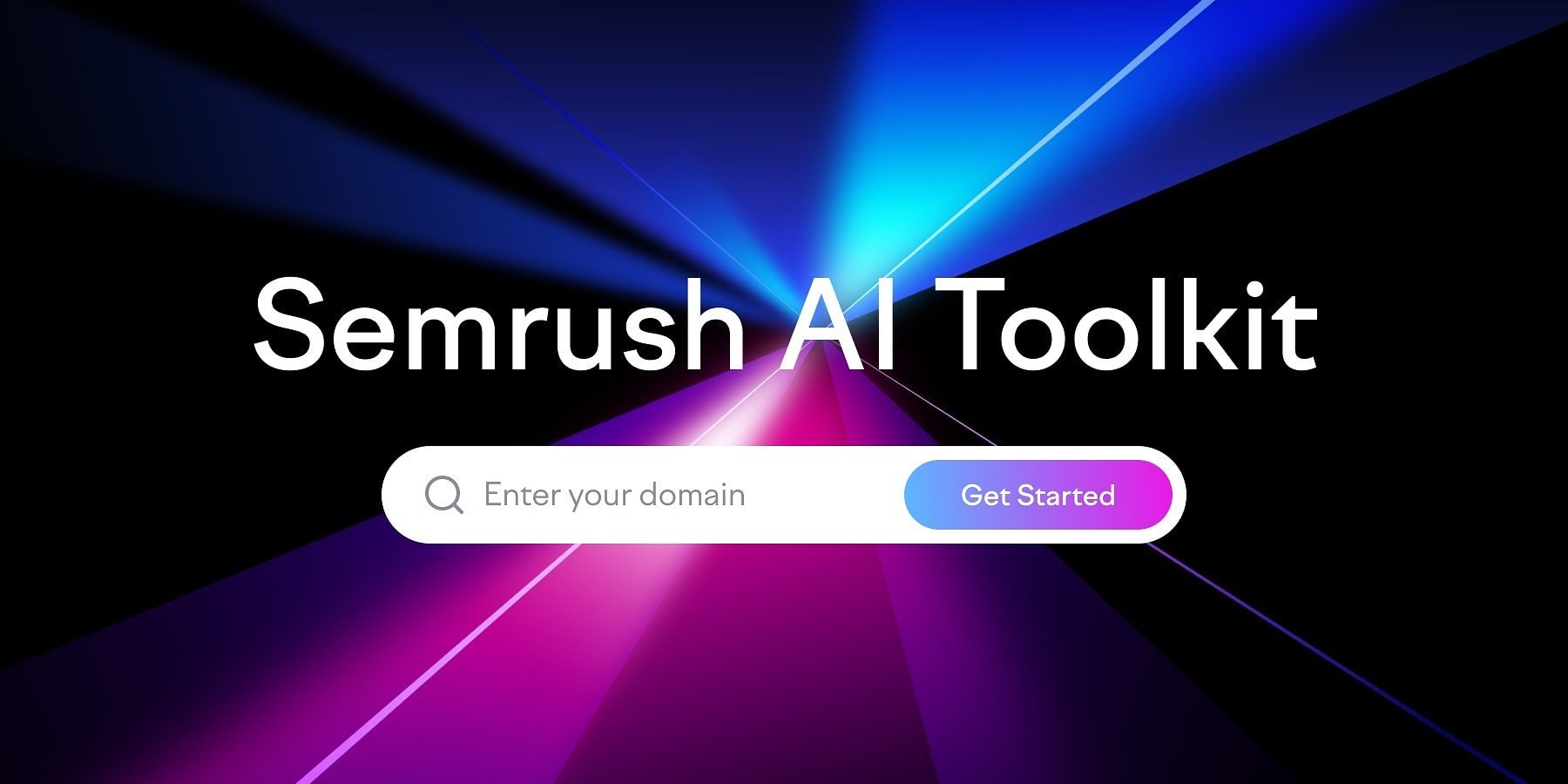
Semrush is one of the most popular seo platforms. In 2025, it comes with an AI powered SEO toolkit. It combines data from search engines, google search console, and other seo software to help you do keyword research, fix technical SEO issues, and create smart blog posts.
According to Semrush (2024), websites using structured SEO tools see up to 34% better search engine rankings within six months.
Key Features:
- AI keyword research: Finds search volume, competition, and search intent.
- Keyword tracking: Monitor how your keywords perform across search results and AI-generated answers.
- Content creation: Suggests titles, meta description, and outlines.
- Optimizing content: Gives tips on internal linking, on page optimization, and content optimization.
- SEO audit: Checks technical SEO issues like slow pages or broken links.
- Competitor analysis: Looks at top ranking pages and search engine algorithms.
Best For:
- Beginners who need an all-in-one seo tool.
- SEO teams, small businesses, and freelancers handling client projects.
- People who want both ai tools and manual control in one place.
How to Use:
- Open an account on Semrush.
- Use the AI powered SEO tools to find target keywords.
- Add those keywords into your blog posts and improve on page optimization.
- Use the audit feature to fix site errors and improve website’s visibility.
Pricing: Semrush has free trials and paid plans. Prices start around $129 per month. For advanced ai powered seo tools, higher plans are better.
3. Ahrefs AI Content Helper
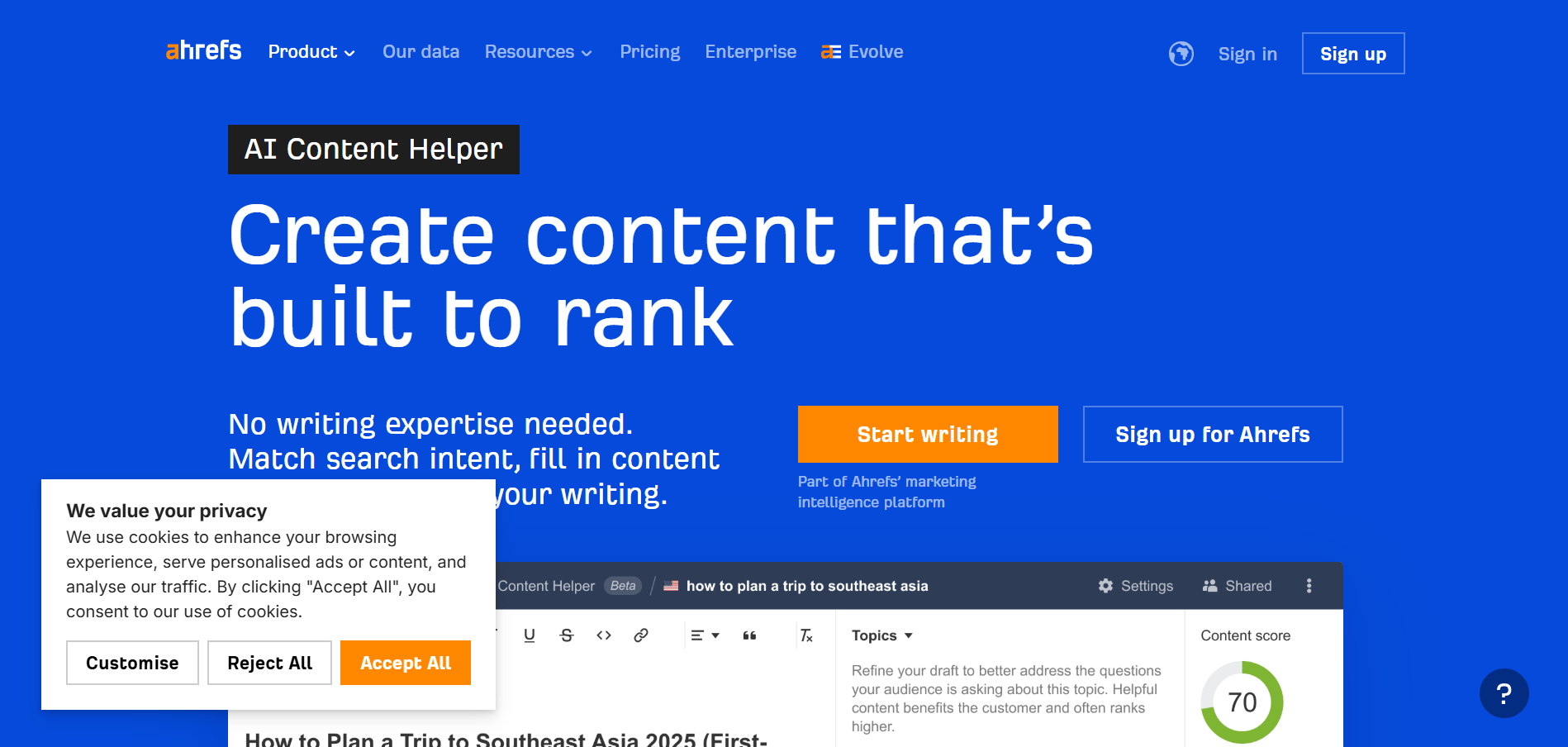
Ahrefs is another leading seo platform. Its AI content helper is built to assist you with content creation and seo strategy. It focuses on making your writing fit what search engines and your target audience expect.
“Data-driven tools like Ahrefs help reduce manual work by 50% while improving accuracy,” notes a report by Search Engine Journal, 2024.
Key Features:
- Content outlines: Generates blog structures using real search intent and relevant keywords.
- Keyword research: Shows search volume and difficulty with deep keyword analysis.
- AI writing help: Drafts short sections, FAQs, and meta description suggestions.
- On page optimization: Gives clear feedback on headings, word count, and internal linking.
- Performance tracking: Works with google search console to see ranking changes.
Best For:
- Beginners who need help with seo content creation.
- Marketers who want to improve search rankings and organic traffic.
- Agencies working on multiple client projects.
How to Use:
- Connect Ahrefs to your site and google search console.
- Use the AI helper to conduct keyword research and plan new topics.
- Follow its outline and suggestions to write better blog posts.
- Check content optimization and internal linking before publishing.
Pricing: Ahrefs starts around $99 per month. The AI content assistant feature is included in most standard plans.
4. Surfer SEO

Surfer SEO is an ai seo tool made to help you write content that search engines like. It looks at top ranking pages and tells you what you need to do to reach better search engine rankings.
“Data shows that optimized content has 30% more chance to get higher ranking,” according to Search Engine Journal 2024.
Key Features:
- Content optimization: Suggests keywords, headings, and word count for your blog posts.
- On page optimization: Checks if your text, images, and meta description are good for search.
- Internal linking: Gives advice on where to link to your other pages.
- Audit: Reviews your site for technical SEO issues.
- Search intent: Finds what your target audience is looking for.
- Advanced SEO techniques: Provides data-driven recommendations to enhance your optimization strategies.
Best For:
- Writers and small businesses.
- People who want step-by-step help to create better content.
- Beginners who need support with search engine optimization.
How to Use:
- Type your target keyword into Surfer SEO.
- It shows a list of relevant keywords and search volume.
- Follow the suggestions for content creation, headings, and links.
- Fix your text using the Surfer score.
Pricing: Surfer SEO plans start at about $89 per month. There is also a 7-day trial.
5. Clearscope
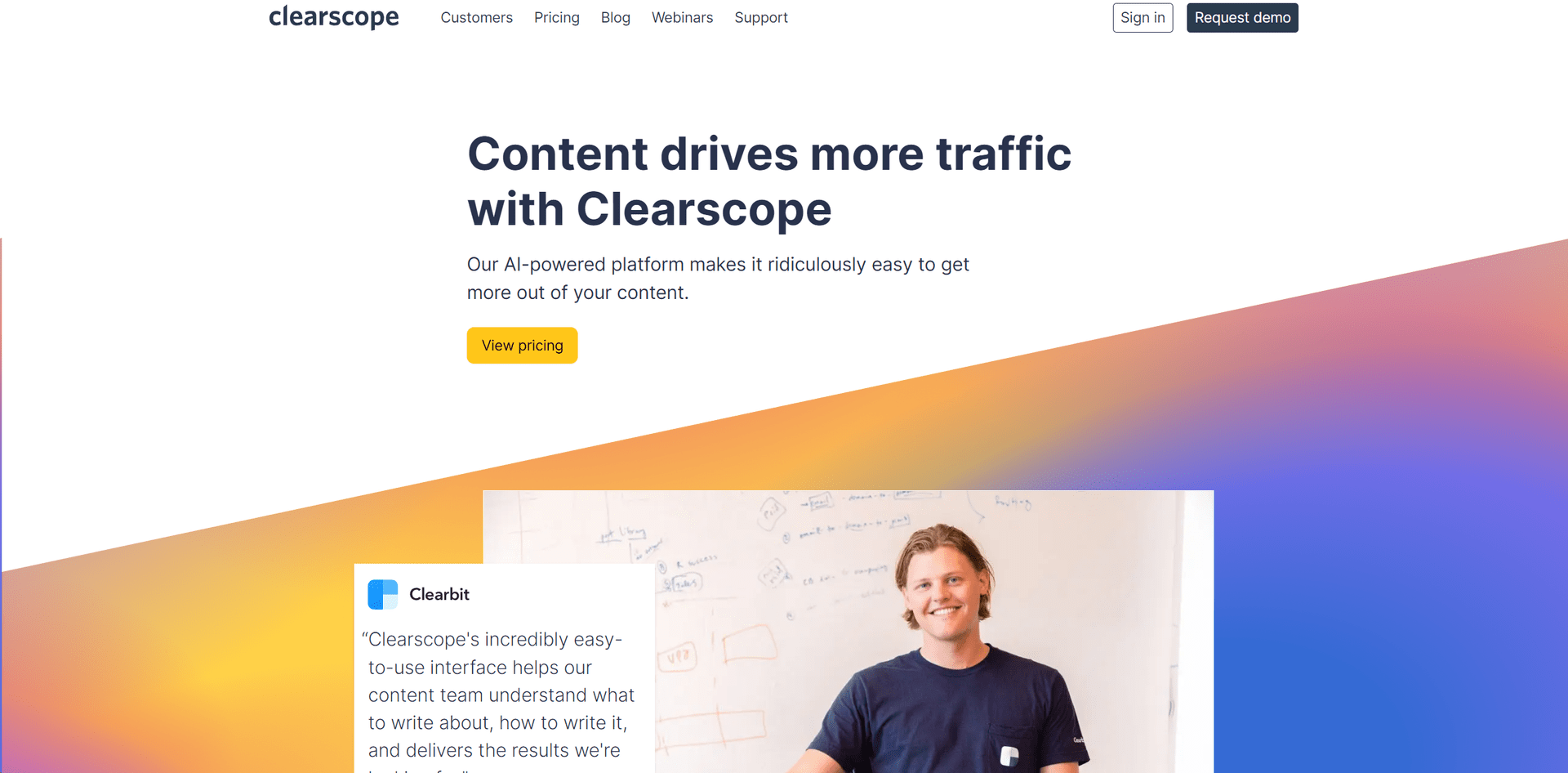
Clearscope is another ai powered seo tool that helps you create content people and search engines trust. It gives a content optimization score for your work. This score is based on search engine algorithms and search intent.
“Content made with Clearscope gets better visibility on search engines,” says a report by Ahrefs in 2024.
Key Features:
- Content analysis: Suggests relevant keywords that make your article match search results.
- Simple content creation: Helps you write articles that meet what search engines expect.
- Improves organic traffic: Guides you to write clear answers to user questions.
- Meta description tips: Shows better titles and descriptions for pages.
- Performance: Tracks ranking and shows if your page reaches top ranking pages.
- Streamlines SEO processes: Integrates keyword research, content optimization, and performance tracking into a single workflow.
Best For:
- Bloggers and marketing teams.
- Anyone who wants their content to meet the needs of their target audience.
- Teams working on client projects that need strong seo results.
How to Use:
- Enter your main topic in Clearscope.
- See what keywords and internal linking ideas it suggests.
- Adjust your blog posts until your content score improves.
- Publish and watch your search engine rankings grow.
Pricing: Clearscope pricing starts at about $170 per month. It also offers a trial plan
6. Frase
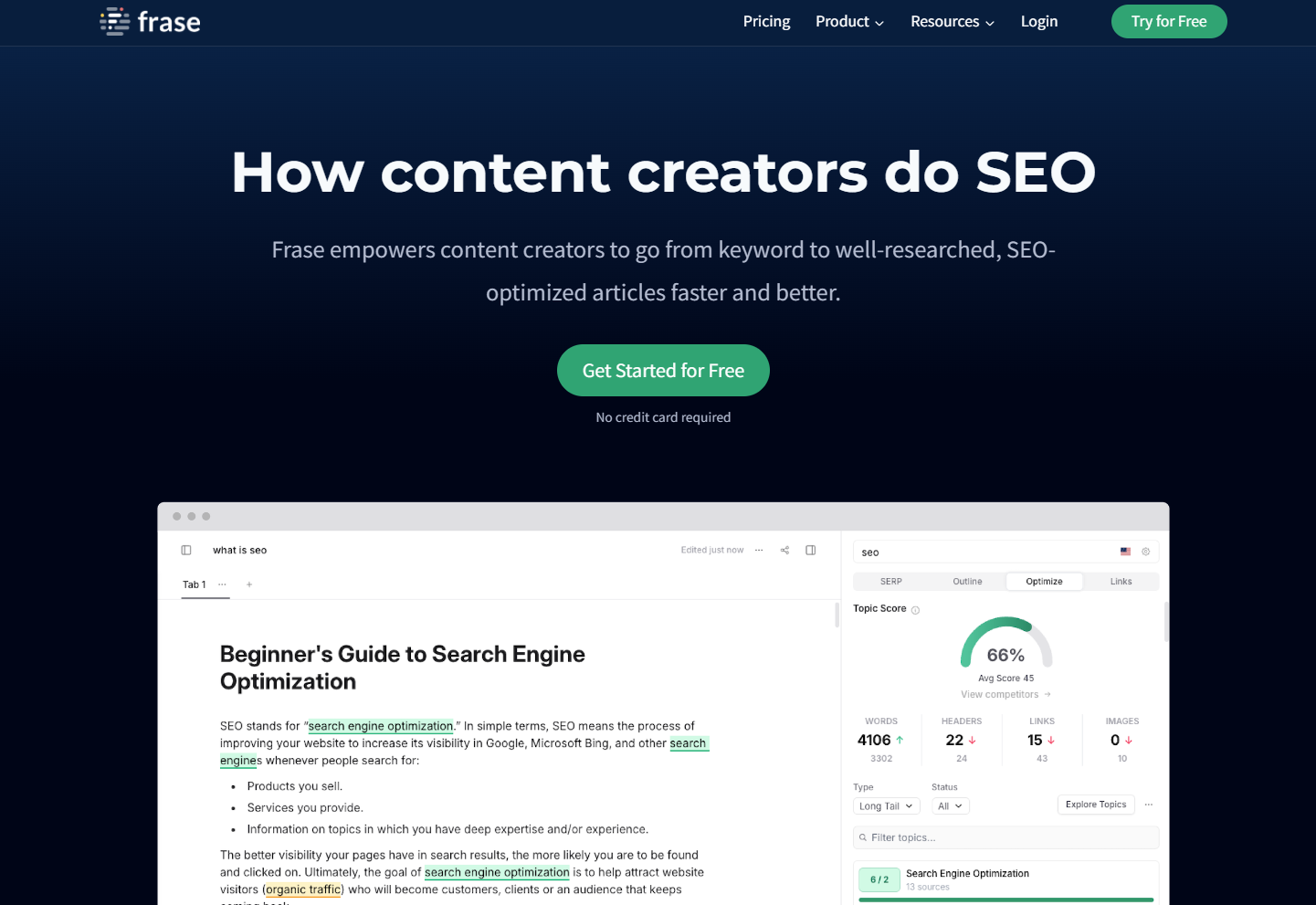
Frase is an ai seo tool that helps you write content that answers real questions. It studies search results and search intent. Then it suggests what you should include in your article.
“Companies using AI tools like Frase save up to 40% time when creating SEO content,” says a 2024 Content Marketing Institute report.
Key Features:
- Content creation: Finds questions people ask online and builds a list for you.
- Content optimization: Suggests internal linking, meta description, and headings.
- Keyword research: Shows relevant keywords, their search volume, and what your target audience wants.
- Research keywords: Uses AI to identify and analyze optimal keywords for your content strategy.
- SEO outline: Creates outlines from top ranking pages so your blog posts match the best seo strategy.
- Search engine algorithms: Uses AI to follow patterns from search engines.
Best For:
- Beginners who want a clear guide for each blog.
- Small businesses or seo teams handling many client projects.
- Writers who want to cover search engine rankings without complex tools.
How to Use:
- Type your target keyword into Frase.
- Get a list of top articles and common questions.
- Follow the outline to write your blog.
- Add internal linking and meta descriptions as suggested.
- Publish and check your results in google search console.
Pricing: Frase pricing starts at around $15 per month for basic use. Advanced plans give more AI features.
7. MarketMuse
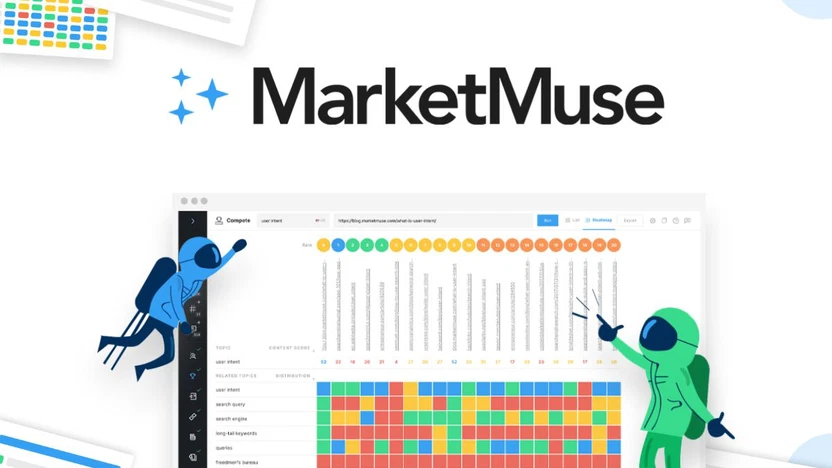
MarketMuse is another strong ai powered seo tool. It helps you plan big topics and build content creation strategies. It focuses on content optimization and shows where you need more details in your article.
“MarketMuse is built to make sure your content is complete and covers all key areas,” reports Search Engine Journal, 2024.
Key Features:
- Content optimization: Analyzes your page for missing topics and on page optimization.
- Keyword research: Suggests relevant keywords with search volume.
- Analyzes search volumes: Helps prioritize keywords based on their monthly search frequency.
- SEO content planning: Guides you to cover a topic fully so you look like an expert.
- Top ranking pages analysis: Compares your work with top ranking competitor pages.
- Internal linking: Suggests how to improve website’s visibility.
Best For:
- Agencies working with multiple client projects.
- Writers who want to publish in-depth blog posts.
- People who need seo tools that do more than just check keywords.
How to Use:
- Enter your topic in MarketMuse.
- Read the suggestions for content creation and content optimization.
- Use the AI to fill gaps and plan links between your articles.
- Recheck and publish your content.
Pricing: MarketMuse plans start at $149 per month. They also have a free limited version for beginners
8. RankIQ
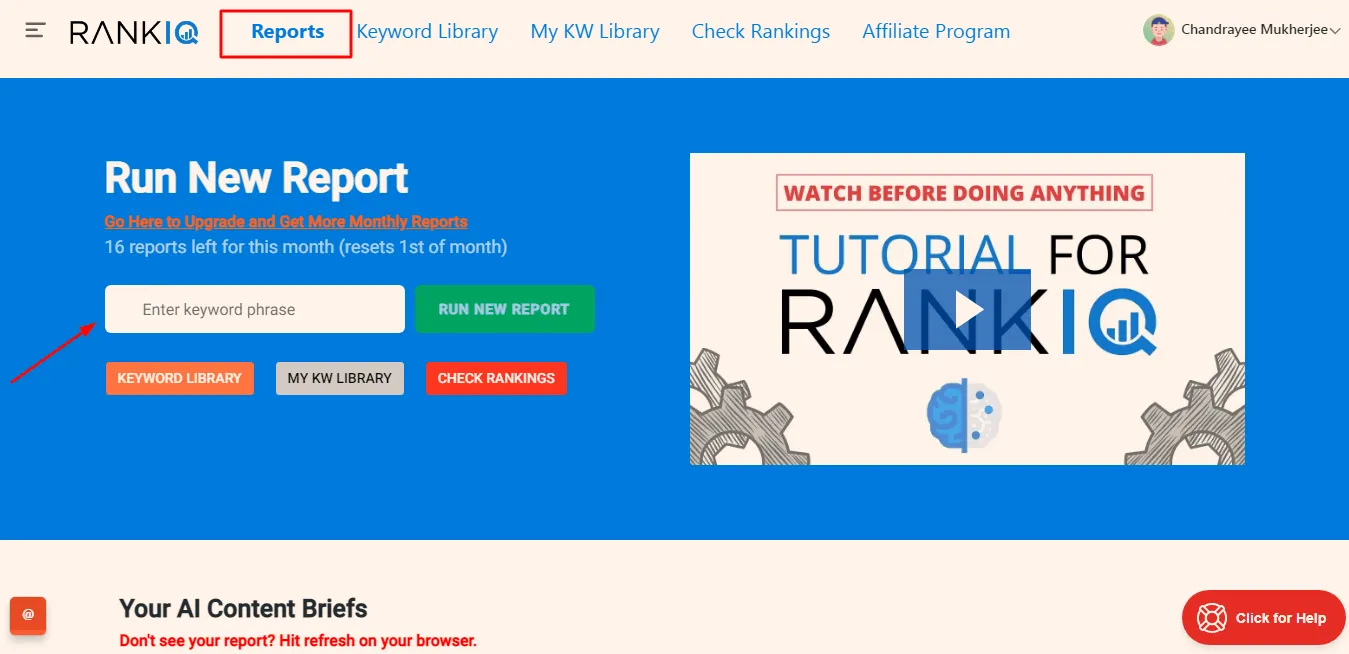
RankIQ is an ai powered seo tool designed for bloggers and small businesses. It studies search engines and finds easy keywords to rank for. It helps you plan your blog so you can reach top ranking pages faster.
"AI SEO tools like RankIQ make ranking 50% faster for bloggers," reports Blogging Research, 2024.
Key Features:
- Keyword research: Shows low-competition topics with good search volume.
- Content optimization: Creates detailed blog outlines.
- Internal linking: Suggests links to improve website’s visibility.
- Meta description support: Helps you write clear titles and descriptions.
- Search intent: Guides you to write content that matches what your target audience is looking for.
Best For:
- Beginners writing blog posts.
- People who want an easy tool without complex seo software.
- Small seo teams or solo creators.
How to Use:
- Log in and choose your topic.
- RankIQ shows a list of easy keywords.
- Use its outline for content creation.
- Add on page optimization suggestions.
- Track progress using google search console.
Pricing: RankIQ starts at around $49 per month. It is affordable for new bloggers.
9. Indexly
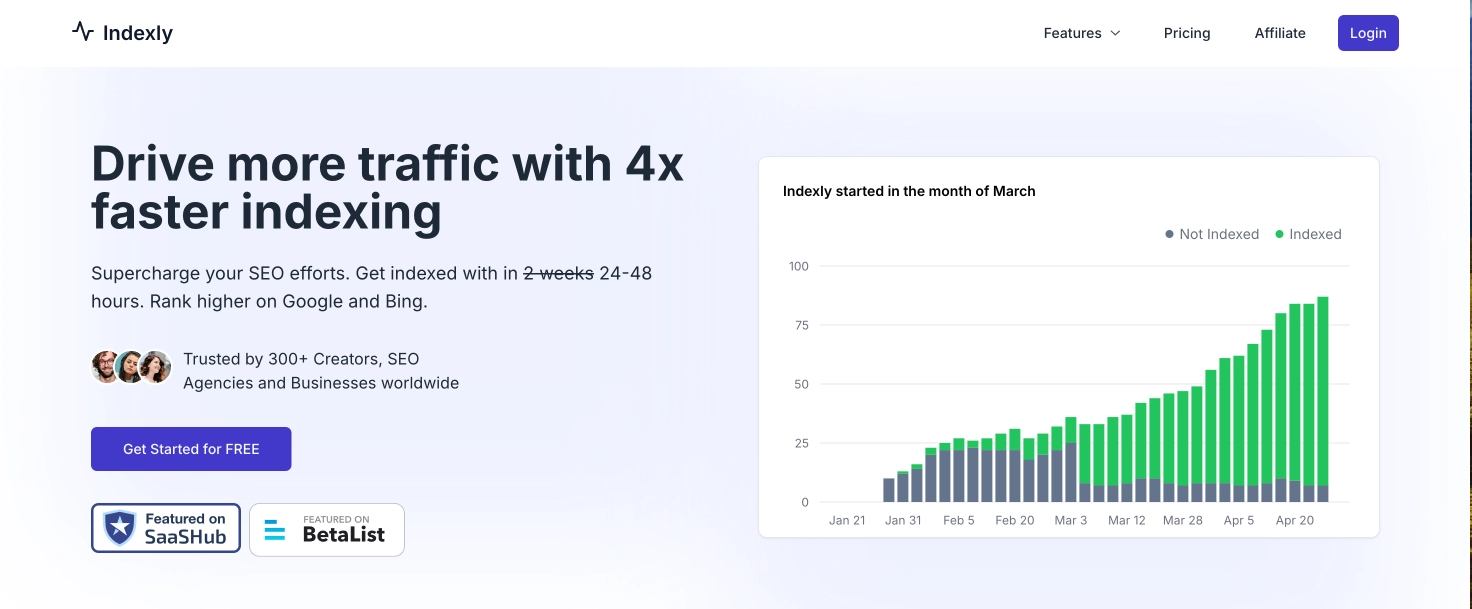
Indexly is a new ai seo tool for 2025. It focuses on making sure your pages get indexed quickly by search engines. It also gives tips for improving search engine rankings and fixing technical SEO issues.
According to a 2024 Web Ranking Study: “Fast indexing and optimized content can raise visibility by 35% in 3 months.”
Key Features:
- Technical SEO: Finds crawling and indexing problems.
- Content optimization: Suggests fixes for on page optimization and internal linking.
- Search engine algorithms: Updates you about indexing rules.
- Reporting: Tracks search engine results and helps you plan your next steps.
- Organic traffic: Monitors your traffic changes after fixing issues.
Best For:
- Businesses that need fast indexing.
- New websites that want to be visible on search engine results pages.
- Agencies managing multiple client projects.
How to Use:
- Connect Indexly to your website.
- It scans your site for indexing issues.
- Follow the tool’s step‑by‑step seo optimization suggestions.
- Use the dashboard to monitor improvements.
Pricing: Indexly pricing starts at about $39 per month. It has a free limited plan for beginners.
10. Writesonic (with AI SEO capabilities)
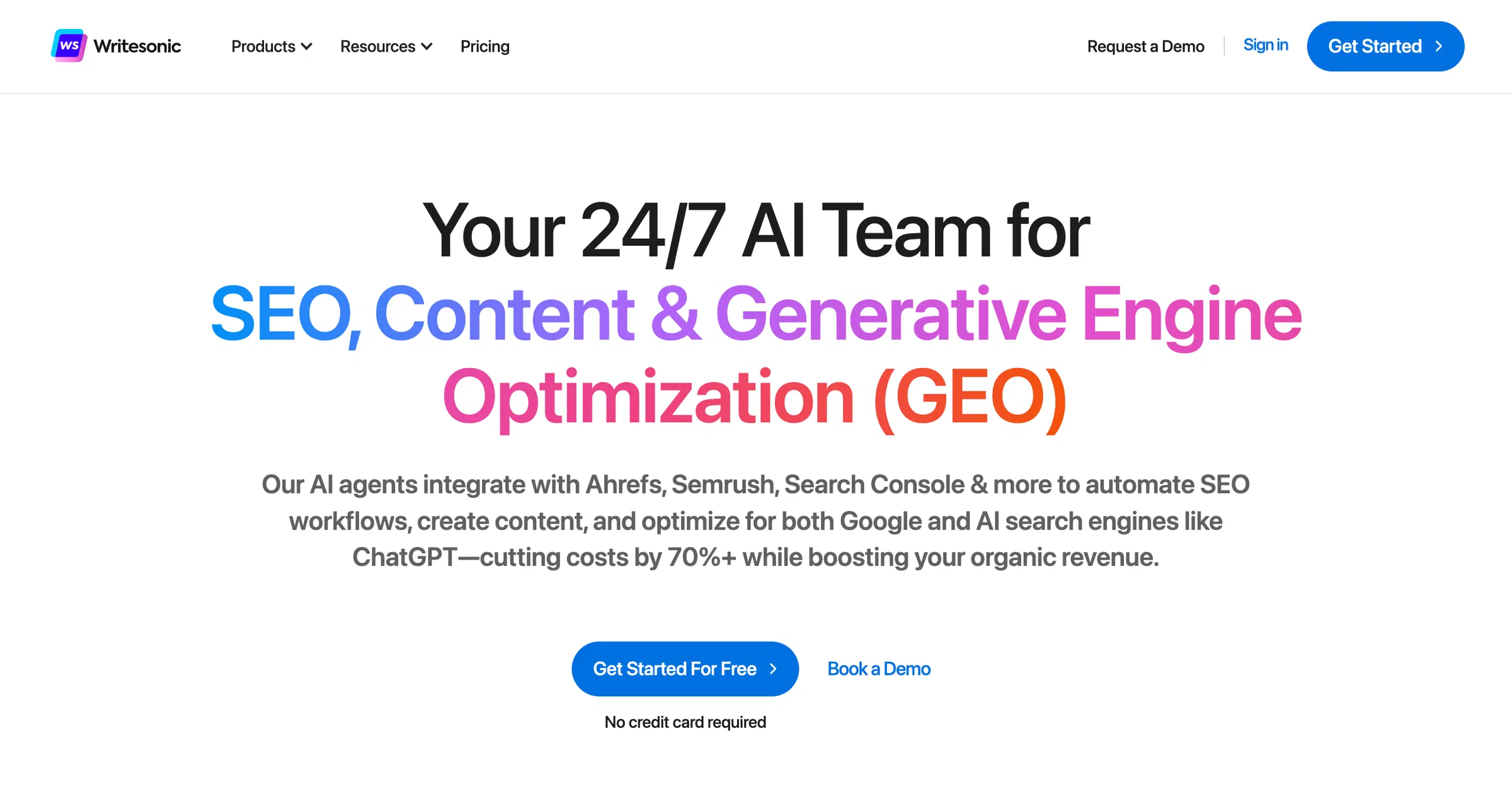
Writesonic is an AI writing tool that now offers ai seo tools. It helps you write articles that rank on search engine results pages. You can create blogs, ads, and even product descriptions with seo optimization built in.
“Content written with AI tools like Writesonic gets 45% more organic clicks,” says a 2024 Content Marketing Study.
Key Features:
- Content creation: Generates blog drafts and meta descriptions in seconds.
- Keyword research: Suggests relevant keywords to include in your text.
- Content optimization: Gives tips on on page optimization like headings and internal linking.
- SEO software: Helps track search engine rankings after publishing.
- AI powered: Uses large language models trained for search intent.
Best For:
- New bloggers who need quick help.
- Businesses that want to publish many blog posts.
- Agencies that want to speed up content creation.
How to Use:
- Open Writesonic and choose “SEO Article Writer”.
- Enter your target keyword.
- The tool gives a draft with optimized headings and structure.
- Edit and add personal details before publishing.
Pricing: Writesonic has a free trial. Paid plans start at $20 per month. Higher plans allow more SEO automation.
How to Do Content Optimization With AI SEO Tools
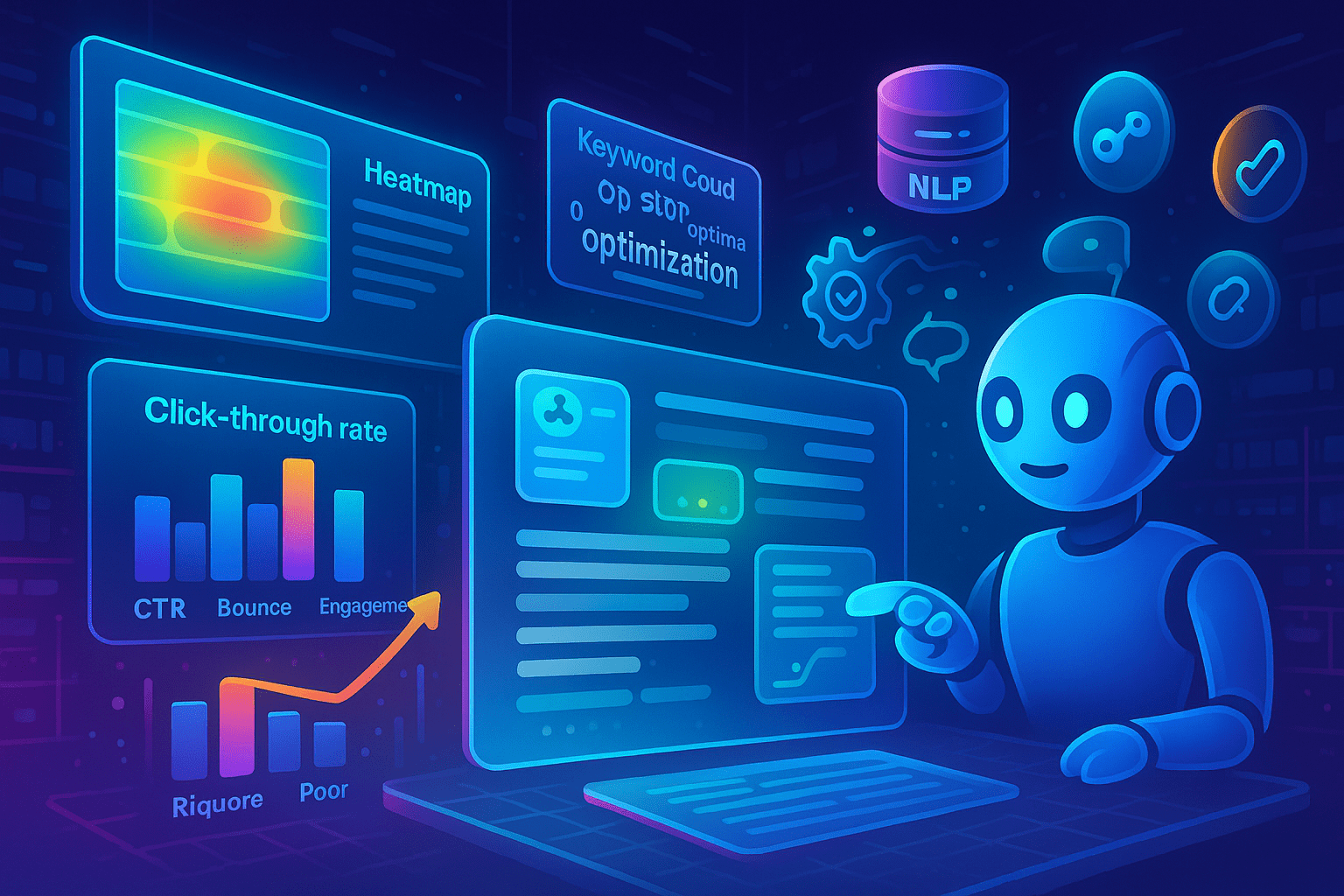
1. Start With AI Keyword Research
Keyword research is finding the right words that people type into search engines. AI tools help you research keywords by analyzing search volumes and identifying the most effective terms for your strategy.
With ai seo tools, you do not need to guess. The tools show you search volume, search intent, and competition for every keyword.
How to implement it:
- Open an AI SEO tool like J6 Venture, Semrush, or Ahrefs AI Content Helper.
- Type in a topic for your blog posts.
- The tool will:
- Suggest relevant keywords
- Show how many people search for them
- Highlight keywords with low competition
- Pick the words that fit your target audience and your goal.
“Websites that use data-driven keyword research see up to 70% better ranking results in 6 months,” reports HubSpot, 2024.
By starting here, your content creation is built on data, not guesswork.
2. Analyze Top Ranking Pages Automatically
AI SEO tools look at the top ranking pages for your keyword. They show you what works and why those pages get organic traffic.
How to implement it:
- Enter your keyword in the tool.
- Let the AI study the search results.
- It will give you:
- Common headings used by these pages
- Word count suggestions
- Topics you must cover
- Internal linking and meta description tips
- Use these insights as a guide while you write.
Why this helps: Instead of copying, you learn what makes a page strong. Then you write a better, clearer version. This is the easiest way to improve your search engine optimization.
3. Get AI Content Outlines and Suggestions
AI SEO tools study search engines and find what structure works best. They give you a ready-made outline with headings, topics, and ideas.
How to implement it:
- Enter your target keyword in your chosen seo tools.
- The tool creates an outline based on search engine results and search intent.
- Use this outline to write your blog posts or improve older content.
- Add sections for meta description, internal linking, and related terms.
Why this helps: You don’t waste time guessing what to write. Your post matches the content creation style of top ranking pages.
According to Backlinko (2024), content written with a clear outline is 43% more likely to appear on page one of search engine rankings.
4. Check Content Score

Content score is a number that shows how good your page is. AI SEO tools read your article and tell you if it has enough keywords, topics, and structure.
How to implement it:
- Paste your text into the tool or write directly in the editor.
- Look at the score – it usually shows green for good and red for weak.
- Follow AI suggestions:
- Add missing relevant keywords
- Improve on page optimization
- Fix titles and meta description
- Add more details for target audience
- Keep adjusting until the score gets better.
Why this helps: A good score means your content matches what search engines want. It improves your chance of getting search engine rankings and steady organic traffic.
“Content scoring systems can improve search engine performance by up to 60% in the first six months,” reports Semrush 2024.
5. Optimize Content While You Write
When you write, AI SEO tools check every line. They make sure your content fits the topic, uses relevant keywords, and covers what your target audience is looking for. This is called on page optimization.
How to implement it:
- Open your AI editor in tools like J6 Venture, Surfer SEO, or Frase.
- Write your article or blog posts directly in the tool.
- Watch the live suggestions:
- Add missing keywords and topics
- Include internal linking to other pages
- Adjust headings for search engine optimization
- Keep your writing simple and helpful.
Why this helps: Optimizing while you write saves time. You don’t have to fix mistakes later.
6. Improve Meta Descriptions and Titles
A meta description and title are short texts that appear in search engine results. They tell people what your page is about. AI tools help you write strong titles and descriptions.
How to implement it:
- After finishing your article, let your AI SEO tool analyze your draft.
- It will suggest:
- Clear and short titles with keywords
- Meta descriptions that answer search intent
- Edit your title and description using these suggestions.
Why this helps: Good titles and descriptions make more people click. More clicks bring more organic traffic.
7. Analyze Competitors with AI
Your best lessons often come from your competitors. AI SEO tools can study the top ranking pages in search engines. They find what works for others and show you gaps in your content.
How to implement it
- Pick a topic or target keyword.
- Use tools like Semrush, Ahrefs, or MarketMuse.
- Let the tool list pages that already rank high.
- The tool will tell you:
- What headings they used
- How long the articles are
- Which relevant keywords they focus on
- Add these ideas to your own blog posts in your own style.
Why it helps: You don’t guess. You use data to create better content.
8. Automate Internal Linking and Updates
Internal linking connects one page on your website to another. It helps people and search engines find more of your work. Updating links manually takes time. AI SEO tools now do this for you.
How to implement it
- Turn on the link suggestion feature in your seo tools.
- The tool checks all your pages and suggests links while you edit.
- It also points out old links so you can fix them fast.
Why it helps
- Links guide your readers to more useful pages.
- Search engines like websites with good linking.
- This process makes content optimization simple and improves organic traffic.
Pro Tip: Set a schedule. Let AI tools run a quick link check every month. It keeps your site healthy.
How AI Helps With Content Creation and Content Marketing

1. Faster Topic Research: AI tools scan search engines in seconds. They show you keyword research, search volume, and trends. You can see what people are reading today without opening 20 tabs. Use AI SEO platforms like Surfer or J6 Venture to find topics for your next blog posts.
2. Understand What People Want: AI studies search intent and user behavior. It tells you why people search for a topic. You can then match your content with what your target audience wants. This improves search engine rankings because your articles answer real questions.
3. Drafts in Minutes: AI SEO tools create drafts in a few minutes. These drafts include headlines, structure, and points. You still edit and add your own voice. “AI is not replacing writers; it is helping them write smarter,” says a Content Marketing Institute report.
4. Better Content Optimization: With AI SEO, you see where your article is strong and where to improve. It checks meta descriptions, on page optimization, and internal linking. This makes your website’s visibility better on search engine results pages.
5. Keeps Your Brand Voice Consistent: AI can learn your brand voice. It makes sure all blog posts sound like you, even if many writers work on your site.
6. Update Old Articles: Old content can lose rankings. AI SEO tools suggest updates, new keywords, and fresh links to recover organic traffic. AI-driven updates help ensure your content remains relevant in a changing digital landscape.
7. Plan Full Content Campaigns: AI tools help you plan a full campaign. From topics to schedule, everything is automated. SEO professionals use these tools to coordinate efforts and achieve better results. This works well for SEO teams and digital marketing agencies.
8. Saves Money and Time: AI SEO saves money. You spend less on manual research and more on quality writing. The result is faster publishing and better search engine optimization without extra cost.
"Let J6 Venture’s AI-powered content audits spot hidden gaps and give you next-step actions — all backed by human review for quality you can trust. Try it now!"
Integrating AI SEO Tools With Google Search Console and Other SEO Software

1. Sync AI SEO Tools With Google Search Console for Real Data: When you link your AI SEO tool with Google Search Console, you see real search data. You can track search engines clicks, impressions, and keywords. Open your SEO software. Go to settings. Connect your Google Search Console account. Allow the tool to pull data daily.
2. Spot Quick Wins With AI Insights: AI SEO tools can point out fast improvements. They can show which pages rank on page 2 but need small changes. You can focus on keyword research, meta descriptions, and simple fixes.
3. Track Keyword Performance Across SEO Platforms: Combine data from Google Search Console, analytics, and SEO platforms. With keyword tracking, you can monitor keyword performance across both traditional and AI-driven search results, including SERP features and AI-generated answers. AI tools show trends like rising keywords, search volume, and search intent. You see how seo tools and seo strategies work together.
4. Automate Reports and Alerts: AI saves time by creating reports and alerts: Weekly keyword performance. Pages losing traffic. New keyword ideas from search engines. You no longer need to check everything by hand.
5. Improve On-Page Optimization: AI helps with on-page optimization: Suggests headings, internal linking, and better content creation. Fixes errors found in Google Search Console like missing tags.
6. Monitor Competitor Activity: AI can analyze top ranking pages of competitors. See their backlinks, search engine rankings, and new blog posts. Use this to plan better seo strategy.
7. Plan Smarter SEO Strategy: Use the data to build better content campaigns. Decide which seo services or seo teams tasks to do first.
8. Scale for SEO Teams and Agencies: For large seo teams or seo agencies, AI makes scaling easy. Share dashboards with everyone. Assign tasks faster using reports.
Managing Client Projects with AI SEO Tools

1. Centralize All Client Data
AI SEO tools help you store all client data in one dashboard. No more switching between files, emails, and spreadsheets.
How to implement it:
- Connect your Google Search Console accounts.
- Pull keyword research, search volume, and meta description data into one platform.
- Use internal linking insights and website’s visibility reports to see progress.
You can quickly view top ranking pages, blog posts, and technical SEO reports without jumping between tools.
2. Automate Reports for Clients
Reports are key to showing results. AI-powered SEO platforms create automatic reports for your client websites.
How to implement it:
- Set up weekly or monthly email reports.
- Include metrics like organic traffic, search engine rankings, on page optimization, and search results.
- Use charts to make results simple to understand.
According to industry studies, automation can save up to 30% of the time agencies spend on client projects.
3. Use AI Insights to Personalize SEO Strategies
AI SEO gives you smart tips for every client. It studies search engines, content optimization, and search trends.
How to implement it:
- Let the AI tools review search engine algorithms and find gaps.
- Plan a content creation schedule that matches user intent.
- Add relevant keywords and internal linking ideas suggested by the tool.
A quote from an SEO expert explains it well: "AI lets us see what clients need before they ask. That means faster results with less guesswork."
4. Track Performance and Spot Opportunities
AI SEO tools make tracking results easy. They bring all the data from Google Search Console and other seo platforms into one place. You do not have to jump between many dashboards. This saves you time.
How to do it:
- Connect your tool with Google Search Console
- Check weekly reports on keyword rankings and search engine results pages
- Look for gaps where you can write new blog posts
Example: A recent study by HubSpot says that “teams using AI for SEO see a 30% faster reaction to drops in traffic.” Use these reports to find new opportunities early.
5. Scale SEO Services Without Extra Stress
Managing many client projects can be hard. AI SEO tools help you manage more work with less effort.
How to do it:
- Use built-in task lists in AI SEO tools
- Set up automatic monthly reports
- Share dashboards with clients instead of sending long emails
Scaling with AI SEO tools means better results for clients and less stress for you.
"Agencies: streamline your entire client workflow using J6 Venture’s AI‑Human solution — get dashboards, task assignments, and real-time insights without big teams. Take action now!"
How to Combine AI-Powered SEO Tools with Traditional SEO Best Practices
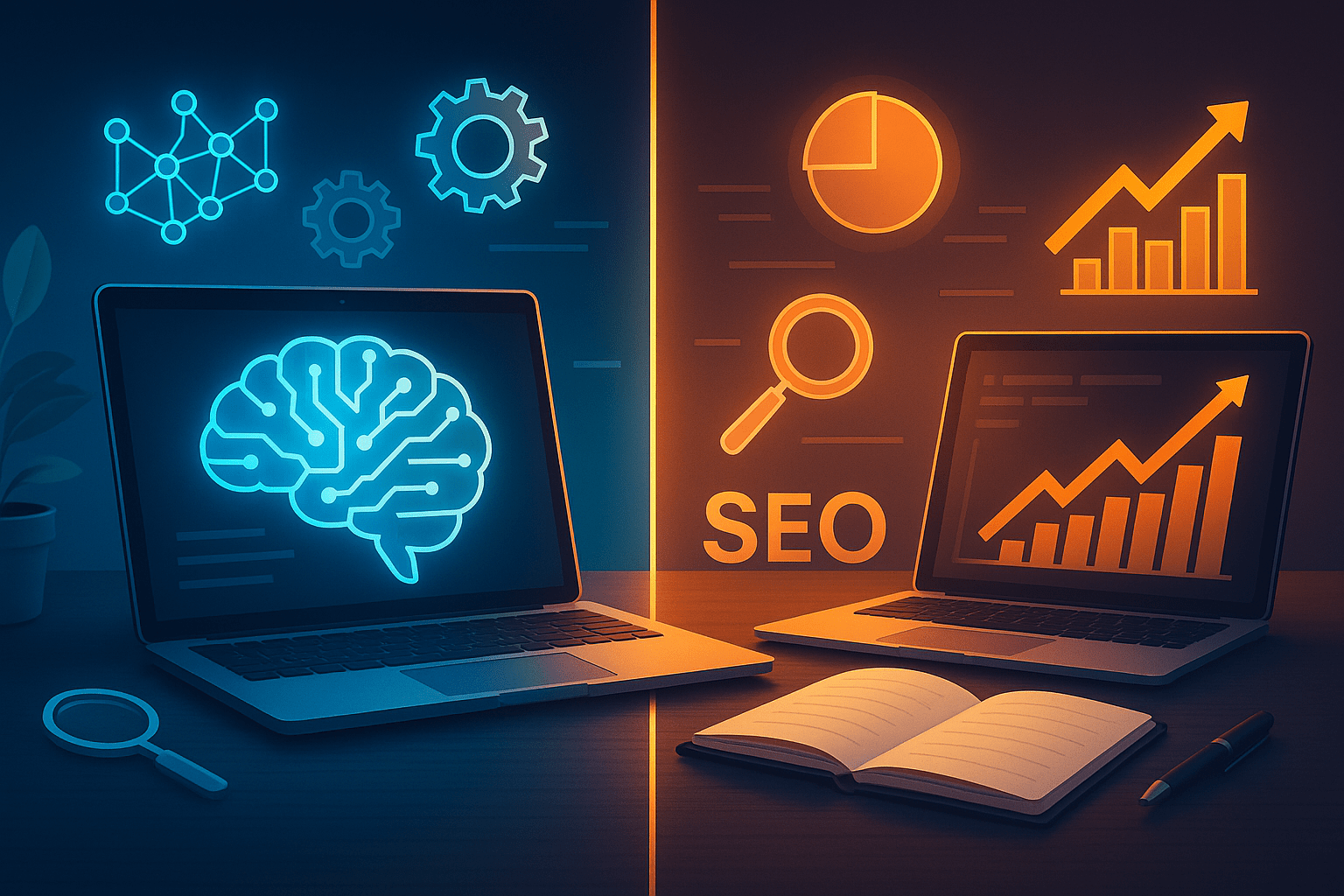
Combining AI-powered tools with traditional best practices is essential for achieving optimal results in keyword optimization.
Integrating AI-driven SEO processes with established SEO techniques allows an SEO specialist or SEO team to streamline content creation, enhance keyword integration, and improve overall content optimization.
This approach leverages both advanced technology and proven strategies for more effective SEO outcomes.
1. Use AI to Conduct Keyword Research, Keep Strategy Human
AI SEO tools can scan search engines fast. They find keyword research ideas that can save you hours. These tools look at search volume, competition, and trends. But don’t let AI decide everything.
What to do:
- Use AI to list new keywords.
- Check which words match your business goals.
- Think about your target audience before finalizing.
Neil Patel once said, "AI can give you data. Humans must give it direction."
2. Balance AI Suggestions with Search Intent
AI can suggest topics and SEO strategies. But search intent is still about people. Sometimes tools give keywords that don’t fit your audience.
How to do this:
- Study search engine results pages (SERPs).
- Make sure the AI suggestions match what users want.
- Always ask: “Does this keyword solve a problem?”
For example, AI might show “SEO software reviews,” but your readers might be looking for “best free SEO tools.” You need to align with real intent.
3. Optimize Content, Don’t Over-Automate

AI can help write titles, meta descriptions, and improve on page optimization. It can even suggest internal linking. But if you let AI create all content, it can sound robotic.
Steps:
- Use AI for outlines and SEO optimization suggestions.
- Write in your own words. Keep your brand voice.
- Update old blog posts manually.
A 2024 SEMrush report found that websites that mix AI and human editing grow 30% faster in organic traffic than those using only automation.
4. Leverage AI for Speed, Use Best Practices for Quality
AI SEO tools can make work faster. They quickly scan search engines and show keyword research ideas in seconds. This saves time for SEO teams. But speed alone is not enough. Good SEO needs quality.
What to do
- Use AI tools to find keyword opportunities and search volume.
- Write your blog posts with clear steps and check grammar yourself.
- Follow traditional SEO best practices like internal linking, proper meta description, and relevant keywords.
5. Monitor Results with AI + Manual Checks
AI SEO can track results, but human checks are still important. Machines can give reports from Google Search Console, SEO platforms, and other SEO software. But you need to read them carefully.
How to use
- Set up AI SEO tools to watch search engine rankings daily.
- Check keyword research data every week.
- Compare AI insights with your own manual review of blog posts and search results.
Why it matters: This mix helps spot errors fast. It also keeps your SEO strategy safe from mistakes that full automation can miss.
6. Combine Technical SEO with AI Automation
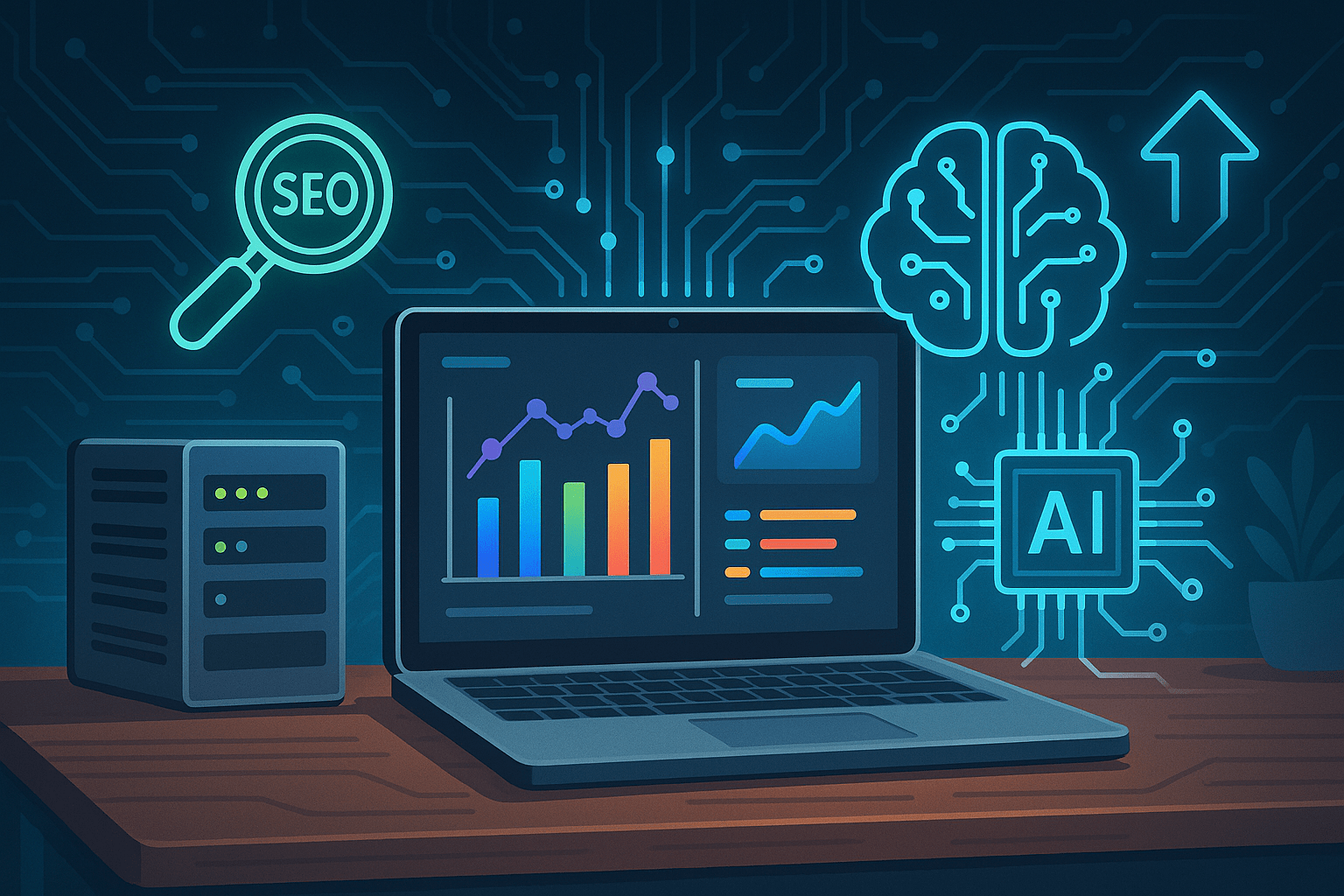
Technical SEO helps a website load fast and stay clean. AI SEO tools can make technical checks automatic. These tools scan search engines, find broken links, and suggest fixes.
How to use
- Automate tasks like on page optimization, website’s visibility checks, and link building with AI-powered SEO tools.
- Use a human review for things that need deep thinking like user intent or content creation style.
Why it matters: This balance makes your site stronger. Search engines love websites that combine automation with manual care.
7. Link Building: Blend AI Suggestions with Relationships
AI SEO tools make link building faster. They find websites and blogs that are a good match for your topic. You can see which search engines already rank these sites. This saves time.
But links are not just numbers. Good links come from trust. Combine AI suggestions with real relationships. Write short emails. Connect with people before asking for a link.
How to do it:
- Use AI tools to list websites with high search engine rankings.
- Check if these sites are relevant to your content.
- Send a simple, clear email.
- Share useful blog posts or guides first.
Experts say, “Strong links come from people, not only data.” Use AI for ideas and speed. Use your own touch for long-term results. This mix makes your SEO strategy stronger.
Advanced Tips: From AI Search Engines to Generative Engine Optimization

1. Target Conversational Search Queries: People now talk to search engines like they talk to a friend. Tools powered by AI SEO can find these questions fast. Use AI SEO tools to collect these questions from AI search engines. Add them as simple answers in your blog posts and web pages. This helps you show up for voice and chat-based searches.
2. Focus on Entities, Not Just Keywords: Search engines care about topics, not only single words. This is called entity search. Make a list of related topics and keywords. Use internal linking between these pages so that search engine algorithms understand the context.
3. Use AI SEO Tools for Content Clusters: AI SEO tools can group keywords into clusters. Clusters make your content strong. Create one main page. Link smaller pages around it. This method makes your site a trusted source.
4. Experiment with Generative Engine Optimization (GEO): GEO is new. It prepares your content for AI-powered answers. Use structured data and clean meta description. Focus on useful and clear answers that AI can pull easily.
5. Monitor AI-Driven Traffic: AI search engines may send new traffic. Watch your traffic using Google Search Console and SEO software. Update content when you see new search intent trends.
Final Note
AI SEO is changing how teams work on websites. It helps seo agencies and seo experts do tasks faster. Use it with digital marketing plans, keyword research, and good search algorithms.
AI SEO tools will never replace human ideas. You still need a primary keyword list, keyword data, and creative content creation process.
Always check search trends and organic search results. Use a seo content assistant or a content marketing tool for small steps. These tools make seo services easy. Blend human thinking with ai seo to get the best results.

.jpg)
.jpg)
.jpg)
.jpg)
.jpg)
.jpg)
.jpg)
.jpg)
.jpg)
.jpg)
.jpg)
.jpg)
.jpg)
.jpg)
.jpg)
.jpg)
.jpg)
.jpg)
.jpg)
.jpg)
.jpg)
.jpg)
.jpg)
.jpg)
.jpg)

.png)
.png)
.png)
.png)
.png)
.png)
.jpg)
.jpg)
.svg)

